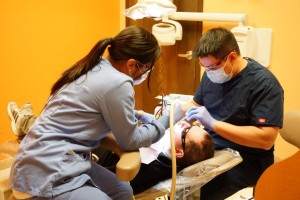How Not Replacing a Missing Tooth can Impact Your Life
According to the American College of Prosthodontics, 178 million people in the United States are missing at least one tooth and more than 35 million people don’t have any teeth, at all. Tooth loss occurs due to a number of issues, including wear, cancer, injury, and gum disease. However, regardless of the reason you may have a missing tooth, the impact on your life is often significant, but do you know the cost of not replacing a missing tooth?
In addition to the common concern about missing teeth making you appear older, there are other real issues and dangers present if you don’t replace missing teeth. Learning more about the longterm costs and risks of not replacing a missing tooth can help you understand why tooth replacement options are so important.
Bone Loss is One of the Risks of Not Replacing a Missing Tooth
One of the most significant dangers related to not replacing a missing tooth is bone loss, also known as bone resorption. Bone loss occurs after a tooth is gone because the natural roots of the tooth are no longer embedded into the jawbone, leaving a void. Over time, the jawbone will begin to deteriorate.
Unfortunately, bone resorption doesn’t only impact the one tooth that’s missing, it actually puts you at risk of losing neighboring teeth and will eventually impact your facial appearance. As time passes without replacing missing teeth, you may notice that your face shape will change gradually and your lips may appear asymmetrical and sunken.
To top all this off, a missing tooth (or teeth) can also increase the chance you will develop gum disease in the area where the tooth once existed or even suffer from tooth decay in neighboring teeth.
Reduced Ability to Speak Clearly and Eat Certain Foods
 In addition to affecting your appearance, another serious risk of not replacing a missing tooth is the reduced ability to eat certain types of foods. Depending on which tooth or teeth are missing, it may become difficult to bite into and chew certain foods. In an attempt to avoid biting and chewing near the missing tooth, you’ll most likely begin overusing other teeth to compensate for the missing tooth or teeth.
In addition to affecting your appearance, another serious risk of not replacing a missing tooth is the reduced ability to eat certain types of foods. Depending on which tooth or teeth are missing, it may become difficult to bite into and chew certain foods. In an attempt to avoid biting and chewing near the missing tooth, you’ll most likely begin overusing other teeth to compensate for the missing tooth or teeth.
Overall, this can eventually lead to diminished health and poor nutrition. For example, a common side effect of missing teeth can be digestive issues as you begin to eat softer foods or don’t fully chew foods before swallowing.
If certain teeth are missing, such as the ones in the front, it can also impact the way you speak and your ability to clearly pronounce certain words. You may develop a lisp or a change in how you pronounce certain words and sounds.
Reduced Self-Esteem
While the examples above are all tangible effects of a missing tooth, there are also a few intangible effects that a missing tooth can have. While you may not be able to see these effects on the outside, they are still present and can impact your life in significant ways.
If a space from the missing tooth can be seen when you smile, eat, or speak, you may start to avoid smiling, eating, and speaking to people in public. This can have a significant impact on your social life, your job, and as a result, the amount of money you are able to earn at your job. If gum disease develops due to the missing tooth, you may begin to experience bad breath, as well.
Depending on your age, career path, and relationship status, the lifetime costs of a missing tooth can really add up if you’re not confident to smile, eat, or speak in front of other people.
Options for Replacing a Missing Tooth
Now that you know many of the potential risks and costs of not replacing a missing tooth, you may want to know what replacement options are available. There are several options to consider, including dentures, dental bridges, and – the most popular and long-lasting – dental implants.
Dental implants are sturdy, durable, and compared to the other options, much longer lasting. In addition to offering all those benefits, dental implants can also help to preserve your jawbone because the titanium post used for the implant will actually fuse with the jawbone over time. This helps to continue stimulating growth and minimizes the potential for bone loss. Dental implants will also help restore your confidence since they look and feel like real teeth after the installation process is complete.
There is no question that dealing with a missing tooth can be a stressful situation. However, if you speak with your dentist, you will quickly discover there are many replacement options available to help fit your lifestyle and budget. Also, getting to know the risks of not replacing a missing tooth can help you see why you shouldn’t wait to have a new tooth placed. There is no reason to allow your oral health to suffer when you can easily restore your oral health, and your beautiful smile.
If you’re in the Chicago, IL area, call us today to book your free no-obligation tooth replacement consultation.
Join Us In the Comments!






3 Comments
Leave your reply.